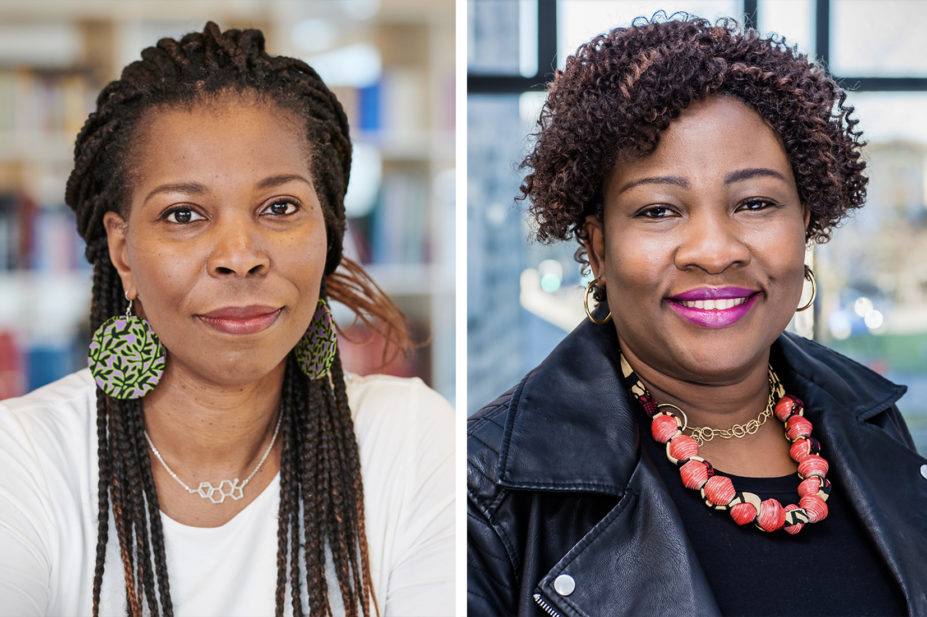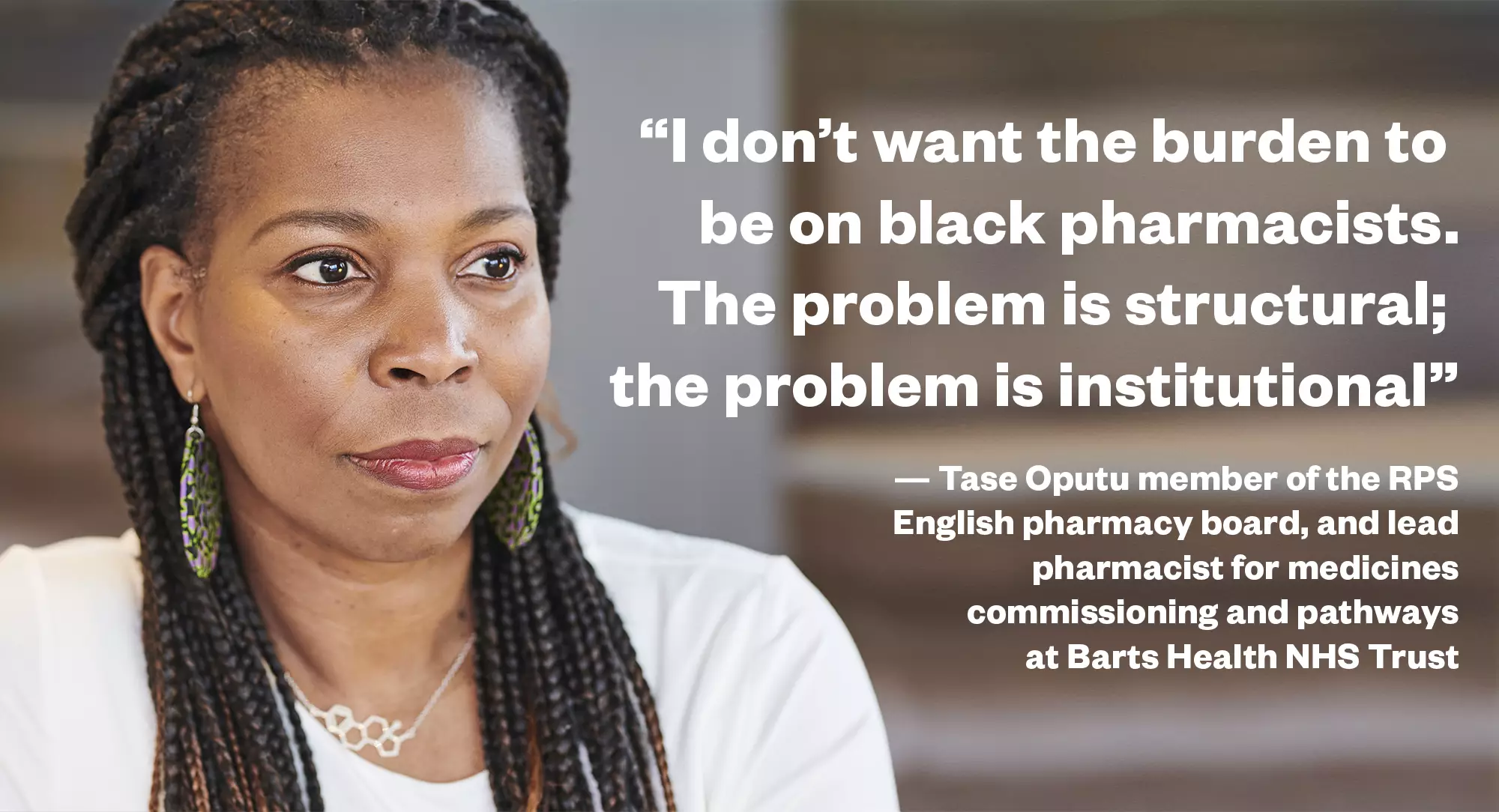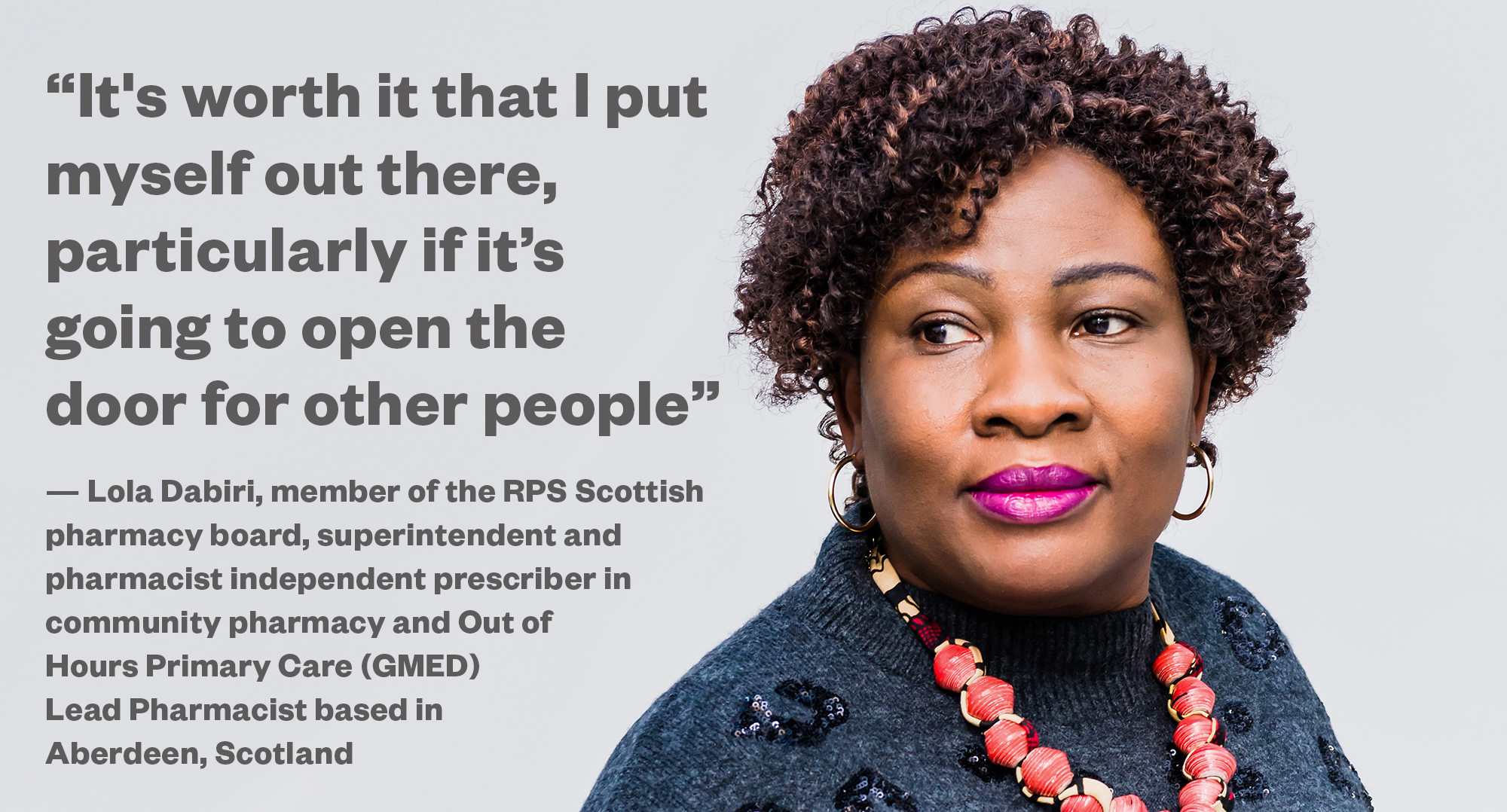
Paul Stuart and Iska Birnie
Tase Oputu and Lola Dabiri are reluctant trailblazers.
The only black pharmacists currently on the Royal Pharmaceutical Society (RPS) English Pharmacy Board and Scottish Pharmacy Board, respectively, Oputu and Dabiri are using their position in the profession to inspire others to think big.
But they both admit that they wish they didn’t have to.
“I don’t want the burden to be on us, as black pharmacists, to be continually trying to solve the problem,” says Oputu, who is lead pharmacist for medicines commissioning and pathways at Barts Health NHS Trust.
“The problem is structural; the problem is institutional.”
This is the clear message that came out of a small survey exploring the barriers that black pharmacists face, which they conducted earlier in 2022 and shared exclusively with The Pharmaceutical Journal. It found that 47% of the 36 black pharmacists who responded felt that, when applying for a more senior or board level role within pharmacy, the recruitment process was not fair.
Add to that the fact that black pharmacy students face the widest awarding gap at university, the lowest pass rates for the registration exam and a lack of diversity in senior pharmacist roles.
“We’ve got something to offer,” says Dabiri, who is also a superintendent and pharmacist independent prescriber in community pharmacy and Out of Hours Primary Care (GMED) Lead Pharmacist based in Aberdeen, Scotland.
“The perspective that we bring, with our wealth of experience, it’s something that should be extremely valued and should be sought. Going forward, each organisation should seek that representation.”
Nearly a year after they were first elected to the RPS boards, we catch up with them about the revelations from their survey, how they want to see pharmacy change and why ‘decolonisation’ is not a dirty word.
What barriers do black pharmacists in the UK currently face?
Lola Dabiri (LD): It’s multifaceted. One, there is no representation; someone, like yourself, that you can look up to in a high position and say “I can do that too”. Before being a board member, I was Grampian local coordinator for the RPS. I remember, when I started, suddenly there was more participation from black pharmacists and preregistration students; seeing someone out there that looked like them gave them that confidence.
Tase Oputu (TO): People don’t think that there is a problem with BAME [Black, Asian and minority ethnic] because they see a lot of South Asian pharmacists in senior positions. But there is. There are very few black pharmacists in senior positions. There was a reminder recently in a report that the General Pharmaceutical Council (GPhC) did on the differential attainment of black, African preregistration pharmacists. This differential attainment builds up as you go along because of the conscious and unconscious bias in recruitment processes and people’s lack of awareness of the problem.
One respondent to your survey said they were told that they were not ready for a role, despite doing the same level of work as other newly employed pharmacists. Were you surprised by that?
LD: It wasn’t a surprise; that kind of thing happened to me. I interviewed with an organisation and when I mentioned some of the academic qualifications that I had, the person seemed surprised, perhaps I even had more qualifications than him, and he was the boss. I was OK with that but I later reached out to him and said “This is what I’ve done recently, could you help me? I need a way forward” and he ghosted me. I asked for help again, at some other point, because I wouldn’t take no for an answer, and he said “I think you’re not ready for that yet”.
TO: It creates a lot of despair among black pharmacists. We are very well qualified, we have experience and we are talented, but we go for these posts and we do not get them. Yet, when I ask people in senior positions in big organisations why they don’t have black people on their boards or in the senior committees, I get told that people aren’t applying or that the competition was really high.

Paul Stuart
In 2021, we did an investigation, which found that most pharmacy schools were committed to decolonising their MPharm degree. But is that enough?
TO: I feel like I was sleepwalking through all of my education — things that I knew were not right, I just went along with. No one told me about sickle cell anaemia. No one taught me about diseases or how things appear on black skin. It’s so important to make sure that we are able to serve the community around us and that every facet of the years that you spend at university makes you feel that you belong. But you can’t just decolonise the curriculum by looking at skin conditions or diseases that disproportionately affect black people. The teaching staff also need to represent the community that they are serving. You need them to be able to understand, interact with and support the students as well.
LD: Absolutely. It’s more of the awareness and understanding of what is needed that we need to standardise — so that we’re giving examples. If we’re wanting something to happen in the future, we need to say there’s a standard in the curriculum.
Some people responded to us that they were offended by the term ‘decolonisation’, what do you say to that?
LD: Everyone has the right to say how they feel. It’s possible that the person who said that, it might be what’s right in their own experience. We have to recognise the fact that we do have what’s call ‘bounded knowledge’; your world is your world.
TO: It makes me cross. Our educational system is geared towards the white lens as a result of colonisation. Decolonising is just changing it from being a very white view. It’s the system that has been introduced that has led everything to be geared that way. It has excluded everybody else and created inequalities to the point where our healthcare and our health outcomes are affected.
What should be done to change the lower pass rates for the pharmacist registration exam from black graduates?
LD: A lot has been done already. Black pharmacists from the UK Black Pharmacist Association and from the African & Caribbean Preregistration Pharmacy Network have been giving a lot of support to students in terms of mentorship. It’s not the maths or the science of the exam, it’s that they’re so battered before going for the exam that they just can’t perform. Some have financial issues and all of that pressure adds to the failure rates.
TO: It goes back to decolonising the curriculum and ensuring that our pharmacy schools have representation from black lecturers; that the people who are delivering the training are doing so in an inclusive way.
An investigation that The Pharmaceutical Journal published in February 2022 showed that more than a third of NHS trusts and health boards had no minority ethnic pharmacists at band 8b and above. Why is that the case?
LD: A black pharmacist called me the other day — she’s done three master’s degrees, is working as an independent pharmacist prescriber and is now working in a mental health specialty. She wanted to do an additional qualification and applied to a university, and they asked her for proof of the fact that she can speak English. Seriously? She has done three postgraduate degrees in the UK, has practised for almost 20 years in the UK — you’re asking her for her proof of English?
TO: Our survey results give a little bit of a picture; people are experiencing racism every step of the way in their careers. If it’s not overt racism, it’s covert racism or the constant microaggressions that you get and then the psychological weathering of being beaten down all the time. The NHS Workforce Race Equality Standard gives a good picture of what’s going on in the NHS and we need something similar to that for pharmacy. We need something that gives us a richer picture of what’s going on with our black and BAME pharmacists, and it needs to come with some sort of sanction or penalty for not improving.

You’re both currently the only black people on your respective Royal Pharmaceutical Society pharmacy boards — how does that feel?
LD: When I got elected, one of my colleagues called me up and said: “Now I know it can happen for me too”. She’s my peer, maybe even more experienced than me, but that’s what she said. It’s worth it that I put myself out there, particularly if it’s going to open the door for other people.
TO: I was really shocked that I was the first black English Pharmacy Board board member, and really humbled. I hope that I bring a rounded view to the things that I contribute to in the board. A lot of what I say is flavoured with my background, because that’s who I am — I’m a black, African woman. I’m Nigerian, that’s me. I bring that lens to everything that we do. I got involved with the sustainability work and it reconnected me to my roots. I’m from a part of Nigeria that has a lot of petroleum companies invested in doing all sorts of things to the environment, so climate change directly affects my family. To be able to talk about representation in pharmacy and to be able to help shape policies that will make things better for the pharmacists who are coming up — that’s a really wonderful thing. But we don’t want to be the last; we are the first, but we don’t want to be the last.
What needs to be done to ensure better representation in all pharmacy leadership bodies going forward?
LD: We need to keep putting the word out there and continue until we see the change that needs to be there. Just last week, we got the news that a black person is now the chair of the GPhC board — it was excellent news.
TO: I don’t think we’ve got time to not have representation at senior levels anymore. If people haven’t applied, they need to find out why and go out and find them. They’re out there. They’re good. They’re just reticent to come forward right now because they’re really demoralised.
What would you say to a black pharmacist who is thinking of putting themselves forward for the Royal Pharmaceutical Society pharmacy boards in the 2022 elections?
TO: Do it. It’s fantastic. You’ll learn so much about pharmacy and it’s good for your career. So, I would just encourage them wholeheartedly to do it.
LD: Very simple words: just do it. You are at the table so you can have your say, you can contribute something good. It would be the opening of further doors, to the future that we’re all looking forward to — equal opportunities for everyone.
- This article was amended on 7 March 2022 to correct Lola Dabiri’s job title


